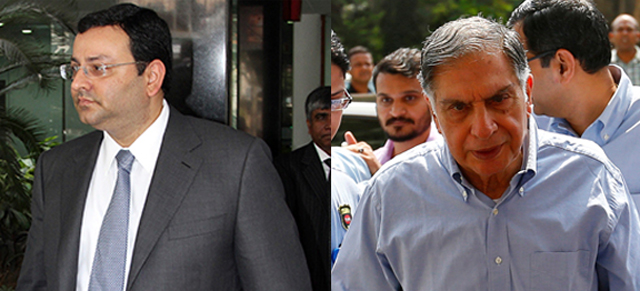
Ever since Tata Sons, the holding company of the Tata Group sacked its then chief Cyrus Mistry on 24 October, the issue has snowballed into what is perhaps the biggest controversy the $100 billion group has faced till date. On Monday, Mistry announced his resignation from the boards of all the listed group companies, and the following day, approached the National Company Law Tribunal against the Tatas.
Yet, this is not the first time the almost 150-year-old conglomerate has been under the media’s scanner in the recent past. On at least seven occasions in the last couple of decades alone, the Tatas have been at the centre of controversies which have threatened to tarnish the group's reputation for good. Here, we take a look at these controversial instances that made big news when they came to light.
The ‘Tata tapes’ controversy: The so-called ‘Tata tapes’ controversy was a complex political scandal that came to light in October 1997, after The Indian Express newspaper published transcripts of telephonic conversations industrialist Nusli Wadia had with the then Tata group chairman Ratan Tata, industrialist Keshub Mahindra, Field Marshal Sam Manekshaw and former Rajya Sabha member Jayant Malhoutra, regarding problems Tata Tea had been having with the then Assam government led by Asom Gana Parishad’s Prafulla Kumar Mahanta, who had accused the company of being hand in glove with terror outfit the United Liberation Front of Asom (ULFA).
The illegal wiretaps published by The Indian Express essentially showed that the Tatas were trying to get the union government to intervene in the matter, at the heart of which was the ULFA trying to extort money from tea companies operating in the state. Yet, at the same time, India Today reported that a Tata group manager Brojen Gogoi had travelled to Mumbai with ULFA’s culture secretary Pranati Deka for medical treatment, the costs for which were borne by Tata Tea. Gogoi was arrested on the charge of assisting an outlawed group. However, Tata Tea said it was not aware of Deka’s identity and had provided her financial assistance as part of a medical aid scheme for the Assamese people.
The controversy died down following the collapse of the union government a few months later, following which Mahanta made his peace with the tea industry in the state.
Tata Nano controversy: In May 2006, Ratan Tata announced plans to manufacture a small car, the Nano, at Singur in West Bengal, on the day the then state chief minister Buddhadeb Bhattacharya was sworn in for another term. Soon, local farmers began protesting, accusing the state government of forcibly acquiring their land. In July 2006, Trinamool Congress chief and the present state chief minister Mamata Banerjee joined forces with the protestors, and the controversy came to a boil by December that year.
By March 2007, even as protests continued, the Tatas signed a lease agreement with the state government. In August 2008 however, Ratan Tata had announced shifting the project, although talks between the state government and Trinamool Congress continue. In September 2008, the state government announced an improved compensation package for the farmers, but the next month, the Tatas announce shifting the project to Gujarat, which was led by the then chief minister and current prime minister Narendra Modi.
The ‘Radia tapes’ controversy: The so-called ‘Radia tapes’ controversy, which broke in November 2010, involved telephone conversations between corporate lobbyist Nira Radia and various industrialists, politicians, journalists and bureaucrats that were leaked to the press. These conversations, which led to widespread allegations of misconduct, came close on the heels of allegations against former telecom minister A Raja, who was one of the main accused in the 2G telecom scam case. One of the industrialists whom Radia spoke to was Ratan Tata. Following the release of these tapes, Tata went to court seeking a restraint on the media from carrying any more such tapes.
Charudutta Deshpande suicide case: On 28 June 2013, Charudutta Deshpande, a former journalist and corporate communications head at Tata Steel was found hanging in his Mumbai residence. Following the suicide, a first information report (FIR) lodged with the Mumbai police had accused Prabhat Sharma, a deputy manager in corporate communications with Tata Steel with abetment of suicide. A handwritten note in Deshpande’s handwriting, recovered from his residence alluded to the fact that there he faced threats from within his department. In 2014, the Maharashtra government transferred the case to the Central Bureau of Investigation.
Bastar steel plant: In 2005, Tata Steel had inked a pact with the Chhattisgarh government to set up a 5.5 million tonnes per annum plant at Bastar at a cost of almost Rs 20,000 crore. The plan could however never materialise, and the company shelved the idea in August this year, citing the delay in land acquisition as the major reason. Moreover, the company could also not prospect an iron ore mine it was allocated in the area as it is infested with Naxal activities.
The Kalinganagar controversy: In January 2005, 13 tribals in Kalinganagar, Orissa were shot dead by the local police while they were protesting the construction of a boundary wall by Tata Steel as part of an under construction project. The tribals were basically demanding a higher compensation for those that were displaced by the construction. This delayed the commissioning of the plant, which finally got partially commissioned in November 2015.
Indian Hotels sexual harassment case: In November 2015, an executive of Taj Hotels wrote to Mistry about her decision to leave the organisation, alleging sexual harassment by Indian Hotels’ chief Rakesh Sarna. By June this year, the matter reportedly reached Ratan Tata, who is said to have taken it up with Mistry. The following month, a probe panel was formed, which is reportedly yet to submit its report. The Economic Times said in a report on 11 November 2016 that the handling of the case was one of the reasons for Tata Sons dismissing Mistry in October this year.